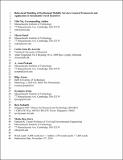| dc.contributor.author | Xie, Yifei | |
| dc.contributor.author | Danaf, Mazen | |
| dc.contributor.author | Lima De Azevedo, Carlos | |
| dc.contributor.author | Prakash, A. Arun | |
| dc.contributor.author | Atasoy, Bilge | |
| dc.contributor.author | Jeong, Kyungsoo | |
| dc.contributor.author | Seshadri, Ravi | |
| dc.contributor.author | Ben-Akiva, Moshe E | |
| dc.date.accessioned | 2020-05-22T19:34:57Z | |
| dc.date.available | 2020-05-22T19:34:57Z | |
| dc.date.issued | 2019-06 | |
| dc.identifier.issn | 0049-4488 | |
| dc.identifier.issn | 1572-9435 | |
| dc.identifier.uri | https://hdl.handle.net/1721.1/125428 | |
| dc.description.abstract | This paper presents a systematic way of understanding and modeling traveler behavior in response to on-demand mobility services. We explicitly consider the sequential and yet inter-connected decision-making stages specific to on-demand service usage. The framework includes a hybrid choice model for service subscription, and three logit mixture models with inter-consumer heterogeneity for the service access, menu product choice and opt-out choice. Different models are connected by feeding logsums. The proposed modeling framework is essential for accounting the impacts of real-time on-demand system’s dynamics on traveler behaviors and capturing consumer heterogeneity, thus being greatly relevant for integrations in multi-modal dynamic simulators. The methodology is applied to a case study of an innovative personalized on-demand real-time system which incentivizes travelers to select more sustainable travel options. The data for model estimation is collected through a smartphone-based context-aware stated preference survey. Through model estimation, lower values of time are observed when the respondents opt to use the reward system. The perception of incentives and schedule delay by different population segments are quantified. These results are fundamental in setting the ground for different behavioral scenarios of such a new on-demand system. The proposed methodology is flexible to be applied to model other on-demand mobility services such as ride-hailing services and the emerging mobility as a service. Keywords: smart mobility; on-demand; incentives; travel behavior; stated preference; 21 sustainability; smartphone app | en_US |
| dc.description.sponsorship | United States. Advanced Research Projects Agency-Energy (DE-AR0000611) | en_US |
| dc.language.iso | en | |
| dc.publisher | Springer Science and Business Media LLC | en_US |
| dc.relation.isversionof | http://dx.doi.org/10.1007/S11116-019-10011-Z | en_US |
| dc.rights | Creative Commons Attribution-Noncommercial-Share Alike | en_US |
| dc.rights.uri | http://creativecommons.org/licenses/by-nc-sa/4.0/ | en_US |
| dc.source | Other repository | en_US |
| dc.title | Behavioral modeling of on-demand mobility services: general framework and application to sustainable travel incentives | en_US |
| dc.type | Article | en_US |
| dc.identifier.citation | Xie, Yifei et al. “Behavioral Modeling of On-Demand Mobility Services: General Framework and Application to Sustainable Travel Incentives.” Transportation 46, 6 (December 2019): 2017–39. | en_US |
| dc.contributor.department | Massachusetts Institute of Technology. Department of Civil and Environmental Engineering | en_US |
| dc.relation.journal | Transportation | en_US |
| dc.eprint.version | Author's final manuscript | en_US |
| dc.type.uri | http://purl.org/eprint/type/JournalArticle | en_US |
| eprint.status | http://purl.org/eprint/status/PeerReviewed | en_US |
| dc.date.updated | 2020-05-14T18:00:27Z | |
| dspace.date.submission | 2020-05-14T18:00:31Z | |
| mit.journal.volume | 46 | en_US |
| mit.journal.issue | 6 | en_US |
| mit.license | OPEN_ACCESS_POLICY | |
| mit.metadata.status | Complete | |
